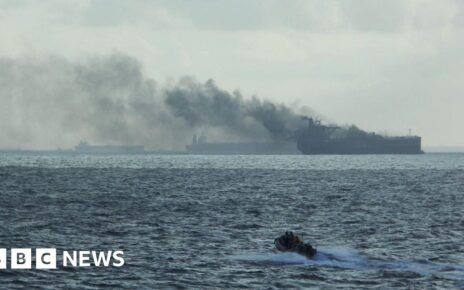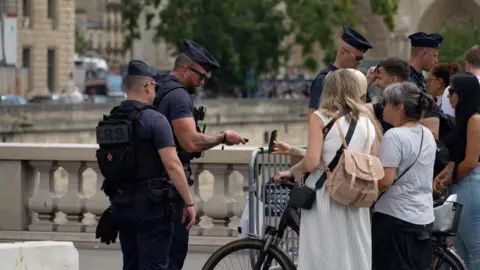 BBC
BBCA scrum of disappointed tourists stared, wistfully, through the maze of metal fences lining the River Seine. Ahead of them, Notre Dame cathedral and other Parisian treasures lay, tantalisingly, out of reach.
“We don’t have a code,” said a woman from Mexico, watching others – armed with the requisite QR security code – pass, with an approving beep, through a police checkpoint.
Further downstream, beside the Eiffel Tower, a weary couple trailing large suitcases performed a slow U-turn on a crowded pavement.
“Closed. You’ll have to walk around,” a French gendarme had just told them, gesturing towards the south.
As Paris prepares to unveil its unique Olympic opening ceremony – a river-based extravaganza that will see athletes on burnished barges being paraded through the heart of the French capital on Friday evening – the country’s police and armed forces are laying the finishing touches to an equally unprecedented security operation.
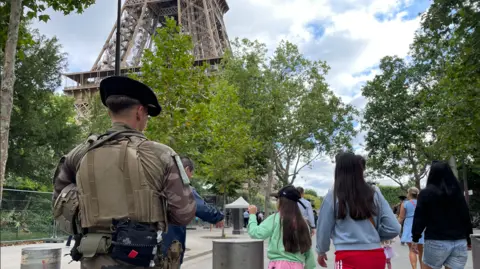
“We are ready,” declared a cheerful President Emmanuel Macron, his customary swagger seemingly undented by weeks of political turmoil prompted by his recent shock decision to dissolve the French parliament.
The security operation – the phrase hardly does justice to the scale of it – involves the largest peacetime deployment of security forces in French history, with up to 75,000 police, soldiers and hired guards on patrol in Paris at any one time.
Roads and metro stations have been closed. Some 44,000 barriers have been erected. And an elaborate system of QR codes has been set up for residents and others seeking access to the river Seine and its islands.
There have, inevitably, been teething problems and frustrations in a city that would ordinarily be teeming with unrestricted foreign tourists.
“I’m a little bit worried. I’ve never seen it so calm. Ninety percent of clients have gone,” said a waiter, Omar Benabdallah, 25, surveying a pavement’s worth of empty tables on the Île de la Cité.
But the French authorities insist the disruption will be both brief – many of the barricades along the Seine will be removed after Friday’s opening ceremony – and worthwhile, with the world treated to a spectacular show celebrating Paris’s history and beauty.
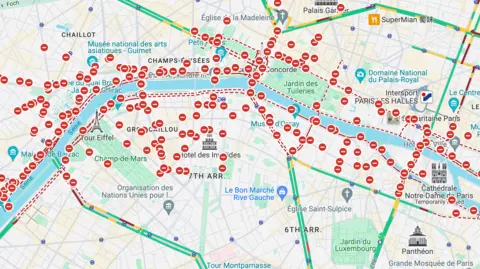 Google
Google“I wouldn’t describe it as a nightmare. We’re focused, and determined,” said Gen Lionel Catar with a half-smile. He’s responsible for coordinating the work of some 5,500 French troops brought into the capital.
Gen Catar acknowledged the “exceptional” scale of the Olympic and Paralympic security operation but explained that it had evolved out of France’s pre-existing Opération Sentinelle, a decade-old response to a string of deadly attacks by Islamist groups and individuals.
“We have demining teams. We have dog teams. There are anti-drone systems, radars, and divers patrolling the River Seine,” said Gen Catar.
The decision to move the operational headquarters from the outskirts of Paris to the grand, sprawling, “École Militaire,” behind the Eiffel Tower was based on advice from UK police following their experience of the 2012 London Olympics.
“I think their headquarters were a bit far from the city centre. They advised us to be close to the politicians in charge and to the police,” he said.
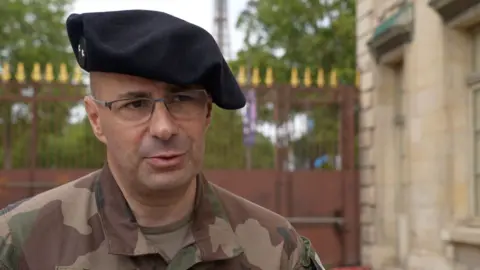
Some 250 British officers – and 50 police dogs – will be in France over the coming weeks, with some joining French foot patrols around the centre of Paris. They are among 1,750 foreign police from dozens of countries taking part in the operation, including Spain, Germany, South Korea and Qatar.
“We’re envisaging nearly half a million UK citizens coming to enjoy the Games. It’s the first time we’ve been able to deploy officers to a major event [abroad] in this way,” said Chief Superintendent Matt Lawler, head of the National Police Coordination Centre.
There has also been direct military cooperation between France and the UK on anti-drone technology, particularly during the opening ceremony.
French officials say there have been no specific threats made towards the Games, but that they’re concerned about “militarised terrorism” – either from abroad or within France. They’re also focused on the risk of cyber-attacks that could target ticketing systems and other infrastructure.
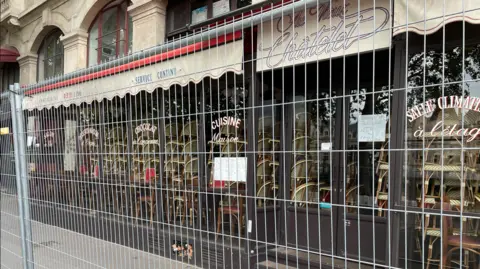
In recent months the government has expressed growing anger at what it believes is a Kremlin-backed online campaign to raise exaggerated fears about security for – and about French preparedness at – the Olympics.
“Interference and distortion of information is not only being carried out by Russia, but also by other countries that we’re watching closely. We’re not naïve. We’re hoping an Olympic truce will be observed…. by all countries,” said Gerald Darmanin, France’s interior minister.
On Tuesday, French police arrested a Russian man suspected of plotting acts of “destabilisation” during the Games.
Earlier on the same day, on the outskirts of Paris, an elite squad of French police carried out another rehearsal for a hostage situation onboard a bus. Amid gunfire and loud explosions, the unit – the same to have responded to the 2015 Bataclan attack – rescued civilian actors trapped inside the bus.
“We’re feeling impatient. We’ve spent more than two years preparing for these Games. Let’s hope we will not have to take any action,” said the unit’s commander, Simon Riondet.




